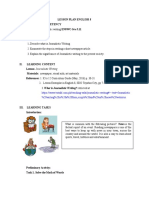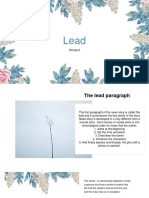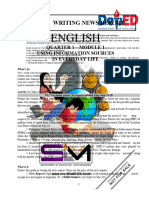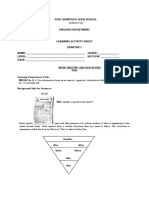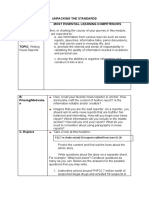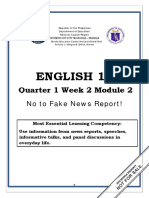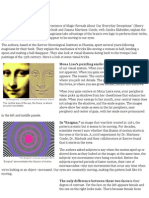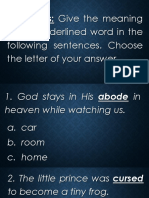Pointers in News Gathering
Pointers in News Gathering
Uploaded by
Daryl Hannah AcenasCopyright:
Available Formats
Pointers in News Gathering
Pointers in News Gathering
Uploaded by
Daryl Hannah AcenasOriginal Title
Copyright
Available Formats
Share this document
Did you find this document useful?
Is this content inappropriate?
Copyright:
Available Formats
Pointers in News Gathering
Pointers in News Gathering
Uploaded by
Daryl Hannah AcenasCopyright:
Available Formats
News Gathering
What is a News?
- A report of recent events
- A material reported in a newspaper or news periodical or on a newscast
- A matter that is news worthy
What is News Gathering?
The process of researching new items, especially those for broadcast or publication.
Methods of Gathering News
OBSERVATION
Observation consists of your actually seeing an event take place and then reporting what you have seen in the form
of a news story.
TELEPHONE CONVERSATIONS
The telephone plays an important role in your daily work as a journalist. It saves you time, legwork and it often enables
you to reach people who are ordinarily too busy to see you in person.
Although a telephone is a very useful instrument, remember it is not the only, and not necessarily the best, method
of gathering news. It should supplement, but not replace, all other methods. Whenever it is proper and convenient, use
the telephone but do not be afraid to engage in a little legwork.
RESEARCH
Research is nothing more than digging out information from files and reference works. Research is used to verify or
amplify facts in news stories and to give depth to feature stories and magazine articles.
INTERVIEWS
About 90 percent of everything in a news story is based on some form of interviewing - either in person, by telephone,
or occasionally by correspondence.
Steps in News Writing
Part 1 of 2:
Planning Your Article
1. Research your topic
2. Compile all your facts
3. Create an article outline
4. Know your audience
5. Interview people
Part 2 of 2:
Writing Your News Article
1. Start with the lead
2. Give all the important details
3. Follow up main facts with additional information
4. Conclude your article
Basic News Writing Structure
The news structure is the overall design of the layout of news works. The main components are: the lead - the main
body- the end. A structure of a news story is based on the style a writer applies.
1. The Inverted Pyramid
In this structure, the information is written in descending order, with the most important points appearing at the top
of the article, and the lesser news written in a shorter, downward direction – ending at a fine point in the manner of a
pyramid that is turned upside down.
2. Narrative
A narrative is story telling. The narrative takes the form of story or book writing in that it provides a beginning, middle,
and end. A narrative helps the reader create a mental image of the story by describing the main character, or characters,
and incorporating dialogue and action.
3. Hourglass Format
The hourglass is not as commonly used an organizational style in journalism - reserved for writing longer stories, such
as feature articles for a Sunday edition.
A. Beginning: The hourglass begins by identifying the “who,” “what,” “when,” “where,” and “why” of the story.
B. Turn: This is a transition from discussing what has happened to how it happened.
C. The Narrative: This portion of the format gives good details to the complexities of the story, and gives greater
context to what led to the events told in the beginning section.
4. Chronological Order Pattern
To put something in chronological order means to put it in order by the time the events occurred. It is common
when journalists are explaining the order in which something occurred, such as a hurricane, tornado, earthquake, or
other natural weather event – or, if the writer deems the most valuable way to relate the story is as it unfolded.
You might also like
- Journalistic Reporting & EditingDocument111 pagesJournalistic Reporting & EditingDiana Burns86% (21)
- News WritingDocument23 pagesNews Writingmaria cielo bataanon50% (2)
- Habraken - The Control of ComplexityDocument14 pagesHabraken - The Control of ComplexitySérgio Padrão FernandesNo ratings yet
- The Third Level - Jack FinneyDocument7 pagesThe Third Level - Jack FinneyRubina FatimaNo ratings yet
- Megillat Esther Tropes PaperDocument3 pagesMegillat Esther Tropes Paperapi-513510848No ratings yet
- EF3e Uppint Filetest 05aDocument7 pagesEF3e Uppint Filetest 05aluis100% (1)
- ENGLISH 10 Q1 Week 12Document12 pagesENGLISH 10 Q1 Week 12Jhonalene PerezNo ratings yet
- Inverted Pyramid Structure SamplesDocument8 pagesInverted Pyramid Structure Samplesmariamzahoor78No ratings yet
- News Writing OutlineDocument5 pagesNews Writing Outlinealardejeandeebelle18No ratings yet
- RIASSUNTO INGLESE 1-5 CapDocument8 pagesRIASSUNTO INGLESE 1-5 Capbeatricecerilli98No ratings yet
- news writingDocument58 pagesnews writingclarizzebalungayNo ratings yet
- Wa0021.Document8 pagesWa0021.Tirthankar LaskarNo ratings yet
- LECTURE News Writing 1Document8 pagesLECTURE News Writing 1Risha Berne EspeletaNo ratings yet
- Structure of A News Story: Inverted PyramidDocument10 pagesStructure of A News Story: Inverted Pyramidameer chirayilNo ratings yet
- Writing News ArticlesDocument7 pagesWriting News ArticlesMonika MukherjeeNo ratings yet
- Essentials of News and in BroadcastingDocument46 pagesEssentials of News and in BroadcastingDEBORAH ADESENo ratings yet
- Journalistic Reporting & EditingDocument112 pagesJournalistic Reporting & EditingDiana Burns100% (2)
- LESSON - PLAN - ENGLISH - 8 Panag LanguageDocument6 pagesLESSON - PLAN - ENGLISH - 8 Panag LanguageJeanibabe Perez PanagNo ratings yet
- Writing: By: Maria Cecilia M. Genove, Ed. DDocument50 pagesWriting: By: Maria Cecilia M. Genove, Ed. DStephanieNo ratings yet
- News ReportDocument2 pagesNews ReportfaamayaNo ratings yet
- Lesson 1.news ReportDocument4 pagesLesson 1.news ReportCatrine PabuaNo ratings yet
- Lecture Notes For JournalismDocument4 pagesLecture Notes For JournalismClaire Faur100% (1)
- IP Study GuideDocument9 pagesIP Study GuideRaghav SamaniNo ratings yet
- Las Eng4 Q4 Week6Document8 pagesLas Eng4 Q4 Week6Be MotivatedNo ratings yet
- MCM 215 News Writing and Organising A News StoryDocument9 pagesMCM 215 News Writing and Organising A News Storyshobitanadeola2005No ratings yet
- Newspaper Structure - Twinkl Teaching Wiki - TwinklDocument8 pagesNewspaper Structure - Twinkl Teaching Wiki - TwinkldragoluffydNo ratings yet
- Group 2 - Powerpoint 3Document12 pagesGroup 2 - Powerpoint 3t59b8nkzs8No ratings yet
- Campus Journalism ReportDocument34 pagesCampus Journalism ReportDainne RegisNo ratings yet
- Jmc1 MergedDocument60 pagesJmc1 Mergedshanibakabeer412No ratings yet
- Editorial CartooningDocument14 pagesEditorial CartooningJoemar Furigay100% (4)
- Principles of Communication SummaryDocument6 pagesPrinciples of Communication SummaryVictor UsieNo ratings yet
- SLM g10 - Module 1Document9 pagesSLM g10 - Module 1Irish Joy MontemayorNo ratings yet
- A Paper Presentation in EL 107Document9 pagesA Paper Presentation in EL 107Raesham AlcantaraNo ratings yet
- Task 2 Noni WidiyaDocument3 pagesTask 2 Noni WidiyaNONIK WIDIYA JAYANTINo ratings yet
- Quarter 1 Week 2 Module 2Document25 pagesQuarter 1 Week 2 Module 2lanieNo ratings yet
- How To Write An Article For A NewspaperDocument2 pagesHow To Write An Article For A NewspaperSonia KarinaNo ratings yet
- Edeng 115Document4 pagesEdeng 115Manzano, Rhealyn G.No ratings yet
- In DepthDocument20 pagesIn DepthsandyanaikNo ratings yet
- Media Writing ChapterDocument22 pagesMedia Writing ChapterBakhtawer ZainNo ratings yet
- To Be Printed 4 ENLA 309-Principles and Practices in Journalism Chapter 4Document10 pagesTo Be Printed 4 ENLA 309-Principles and Practices in Journalism Chapter 4eliaseba76No ratings yet
- Newsgatheringshow 200410071916Document13 pagesNewsgatheringshow 200410071916roseanneellorinNo ratings yet
- Learning Activity Sheet 1 (1st Quarter)Document5 pagesLearning Activity Sheet 1 (1st Quarter)chepie creencia100% (2)
- How To Write A News ReportDocument2 pagesHow To Write A News ReportTehreem TamannaNo ratings yet
- Sample Learning PlanDocument28 pagesSample Learning PlanChamisiah Jezreel Esteleydes BajarNo ratings yet
- Englkish NotesDocument2 pagesEnglkish NoteslinaungkhantbrainworksNo ratings yet
- Newspaper Reporting Notes - Original - Docx11111111Document102 pagesNewspaper Reporting Notes - Original - Docx11111111j ngahu100% (3)
- Feature Story: Its Concepts and Nature: DiscussionDocument11 pagesFeature Story: Its Concepts and Nature: DiscussionRaquel LimboNo ratings yet
- English Paper Group 6Document12 pagesEnglish Paper Group 6Elferina Y SiregarNo ratings yet
- English 10 q1 Module 2021Document15 pagesEnglish 10 q1 Module 2021Daisy Jade Mendoza Dato100% (3)
- ENGLISH 10 - Q1 - Mod2 - Writing A News ReportDocument13 pagesENGLISH 10 - Q1 - Mod2 - Writing A News ReportFrancesca Shamelle Belicano RagasaNo ratings yet
- AP Style Media Ethics The Inverted Pyramid Writing Leads Press ReleasesDocument16 pagesAP Style Media Ethics The Inverted Pyramid Writing Leads Press ReleasesPrincely AngNo ratings yet
- Unit 14 Reporting News: What Are The Steps in Broadcasting News?Document8 pagesUnit 14 Reporting News: What Are The Steps in Broadcasting News?Tsania HasnaNo ratings yet
- Fundamentals of News ReportingDocument8 pagesFundamentals of News Reportingapi-729360274No ratings yet
- 009 010 Eng 119 CampjournDocument4 pages009 010 Eng 119 CampjournGenine Mae AgramonNo ratings yet
- News Writing and CopyreadingDocument14 pagesNews Writing and CopyreadingAgatha Dominique Bacani100% (1)
- Feature WritingDocument6 pagesFeature Writinganna liza abutarNo ratings yet
- Qualities and Characteristics of News Are Accuracy, Balance, Concise, Clear & CurrentDocument5 pagesQualities and Characteristics of News Are Accuracy, Balance, Concise, Clear & CurrentRaquel LimboNo ratings yet
- The Writing of News: A Handbook with Chapters on Newspaper Correspondence and Copy ReadingFrom EverandThe Writing of News: A Handbook with Chapters on Newspaper Correspondence and Copy ReadingNo ratings yet
- Newspaper Reporting and Correspondence A Manual for Reporters, Correspondents, and Students of Newspaper WritingFrom EverandNewspaper Reporting and Correspondence A Manual for Reporters, Correspondents, and Students of Newspaper WritingNo ratings yet
- News Writing The Gathering , Handling and Writing of News StoriesFrom EverandNews Writing The Gathering , Handling and Writing of News StoriesNo ratings yet
- RPS InfiniaDocument22 pagesRPS Infiniaars_delNo ratings yet
- Attwn Dialectical JournalDocument5 pagesAttwn Dialectical Journalapi-439323981No ratings yet
- 2 Voice Manual ExtendedDocument33 pages2 Voice Manual ExtendedL'ange RougeNo ratings yet
- The Show: LenkaDocument6 pagesThe Show: LenkaRichard VarronNo ratings yet
- Review of "The Mythology of The Secret Societies" by J.M.RobertsDocument4 pagesReview of "The Mythology of The Secret Societies" by J.M.RobertsTomaso100% (1)
- How Visual Illusions Work - WSJDocument2 pagesHow Visual Illusions Work - WSJCathy ApanNo ratings yet
- An Afternoon of Tagore With Rezwana SponsorshipDocument3 pagesAn Afternoon of Tagore With Rezwana Sponsorshipuahiso2010No ratings yet
- Going Solo Chapter 1Document14 pagesGoing Solo Chapter 1Southern California Public RadioNo ratings yet
- Senior Portfolio - Appreciation LetterDocument2 pagesSenior Portfolio - Appreciation Letterapi-459942030No ratings yet
- Ijresm V1 I12 183 PDFDocument4 pagesIjresm V1 I12 183 PDFGunNandaTianPurnamaNo ratings yet
- Circuit Cellar 2015 PDF 43 PDFDocument3 pagesCircuit Cellar 2015 PDF 43 PDFErinNo ratings yet
- Unit 1 - SpeakingDocument8 pagesUnit 1 - SpeakingAndrew WuNo ratings yet
- A Good Woman Essay HelpDocument2 pagesA Good Woman Essay HelpGiles CreelmanNo ratings yet
- Cellular JailDocument6 pagesCellular JailRohan PandhareNo ratings yet
- Simple 10-Petal Afghan Square CrochetDocument2 pagesSimple 10-Petal Afghan Square CrochetZubda Farooq100% (2)
- Directions: Give The Meaning: of The Underlined Word in The Following Sentences. Choose The Letter of Your AnswerDocument11 pagesDirections: Give The Meaning: of The Underlined Word in The Following Sentences. Choose The Letter of Your AnswerDarwin AnilasNo ratings yet
- Bad Kids and Bad Feelings: What Children's Literature Teaches About ADHD, Creativity, and OpennessDocument18 pagesBad Kids and Bad Feelings: What Children's Literature Teaches About ADHD, Creativity, and OpennessIrisha AnandNo ratings yet
- 00 - Cerebria - CardGame - RULESDocument12 pages00 - Cerebria - CardGame - RULESRojas MarceloNo ratings yet
- Davao Region Final ReportDocument3 pagesDavao Region Final ReportJoyce Pamela JunsayNo ratings yet
- The Second Movement in DramaDocument29 pagesThe Second Movement in DramaHarshita ChandoliaNo ratings yet
- WalkingDocument1 pageWalkingviji senthilkumarNo ratings yet
- To Obey Is Better Than SacrificeDocument7 pagesTo Obey Is Better Than SacrificeGrace Church ModestoNo ratings yet
- 1689 London Baptist Confession Source History & Gospel Extent - 1689 Chapter 20Document65 pages1689 London Baptist Confession Source History & Gospel Extent - 1689 Chapter 20Sovereign Joy Community ChurchNo ratings yet
- Comprehension A gOOD NIGHTDocument8 pagesComprehension A gOOD NIGHTAhmed Samir50% (2)
- Okuyama SenseiDocument1 pageOkuyama Senseimaronzo17No ratings yet
- W3schools: Bootstrap Get StartedDocument5 pagesW3schools: Bootstrap Get StartedWylk BeserraNo ratings yet

















